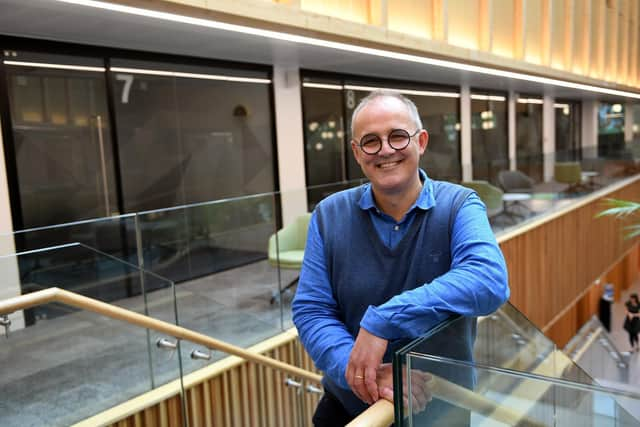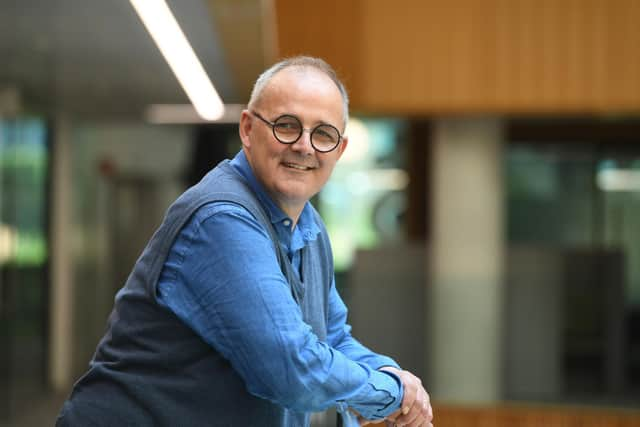How Paul Baverstock went from advising the King of Tonga to improving people's health
Paul Baverstock has advised the King of Tonga, helped secure the release of political prisoners in Belarus and in 2002, after Teresa May referred to the Tories as the “nasty party”, his job was to rebrand it.
“An impossible job,” he laughs.
But the biggest challenge Paul faced was personal. In 2006, aged 36, he was diagnosed with stage 4 lymphoma. “The chances of survival were not particularly good.” Now 53, he’s not only survived cancer, but heart failure.


Advertisement
Hide AdAdvertisement
Hide AdAll this has shaped a major new initiative Paul is launching in Leeds this month, which has the hugely ambitious aim of reducing health inequalities.
The Caterpillar App – so called as small steps can have transformative results – uses Nobel Prize winning behavioural science to encourage people to move more and eat healthier. Its ambition is to have large population-level outcomes, helping to prevent avoidable ill-health, such as obesity, type-2 diabetes, heart failure and common cancers.
The concept came from a Canadian company, Carrot Rewards, which Paul had advised. He’s recruited several of the Carrot team to launch Caterpillar in Leeds, and is opening a Toronto office to run alongside their offices at Nexus at Leeds University. Paul’s career, and personal experiences, lie behind it.
From a working-class background, Paul’s parents both worked at John Crowther’s woollen cloth mill in Marsden, West Yorkshire.


Advertisement
Hide AdAdvertisement
Hide AdHis father then retrained as a youth worker, and his mother worked in cosmetics retailing before opening a hardware shop.
“We had a very politically conscious household. Particularly my dad, who was a trade unionist and a Labour Party member. It was always part of the conversation – how do you create a well-functioning society, and what are the political implications?”
His dad coached the local football teams, as well as his son. After getting a sports scholarship, Paul was spotted by a coach, and given the option to apply to Harvard University.
“Talk about an innocent abroad. No-one in my family had been to school past 16 let alone university, and when I went to Harvard I’d never been on a plane before.”
Advertisement
Hide AdAdvertisement
Hide AdAfter a spell in New York as a business analyst with Kearney Financial Services, where he was sponsored through Yale University School of Management, he took a job in their London offices.
“I wanted to come back and get involved in British politics. My long-standing ambition had always been to be influential in the delivery of public policy, whether that be through a career in politics, or in government.”
Aged just 32, he got the job of Director of Strategic Communications for the Conservative Party when Ian Duncan Smith was Leader of the Opposition and Blair was Prime Minister.
What followed was an “intoxicating” time. “You’re the centre of everybody’s attention. People are interested in knowing you, and knowing your views. So, politics becomes a very self-referential pastime.”
Advertisement
Hide AdAdvertisement
Hide AdHis political stance echoes the work he does now with the Caterpillar App.
“Caterpillar works if we actually get serious about preventative care, but preventative care requires both an emphasis on government and individuals to take responsibility for their own health. So, there is that balance between state provision and individual responsibility. It’s that balance that made me, then anyway, think I was more of a Conservative than a Labour supporter.”
Paul put together the Fair Deal for Everyone programme, trying to straddle the working-class voters with the moneyed-classes who typically vote Conservative. He was sacked after Ian Duncan Smith lost his leadership challenge.
“The Conservative Party is really good at bringing down leaders. I got to see the Conservative Party at its worst, which echoes today.”
Advertisement
Hide AdAdvertisement
Hide AdA political columnist, Paul has spent the last year “slamming Boris” for his “complete lack of integrity”.
“It’s becoming increasingly difficult to reconcile having Conservative views with wanting to create a financially sustainable National Health Service.”
Paul worked at Bell Pottinger before and after his stint with the Conservative Party. His work took him around the world, from advising the Yemeni cabinet on inward investment strategies to running a Special Relationship Campaign to raise awareness against the fact Americans could extradite British people to the States, “doing away with a thousand years of judicial history for the purposes of political expediency”.
Paul says: “I was really proud of working with the King of Tonga, where we advised them on a democratic transition from a tribal monarchy to a democracy. We managed that process, which was ultimately successful, so that was fantastic.”
Some of the work tested his morality.
Advertisement
Hide AdAdvertisement
Hide Ad“The way I reconciled it is whatever situation I was providing advice, I was trying to get the client to a position which had the most integrity. In the end, it sounds silly, but truth and goodness are the best communicators, I strongly believe that.”
When the opportunity arose of Director of Strategic Communications at NHS Digital, he snapped it up. The role straddled the Department of Health, NHS England, and NHS Digital as he led Paperless 2020 – the digital transformation plan for health and social care. From there, he helped the British Medical Association reposition itself as a partner to government after the contentious junior doctors’ strike.
“I’m alive because the NHS kept me alive. I have a huge debt of gratitude to the NHS and I’m a great believer that the NHS is an integral part of the definition of who we are as Britons, and an essential component of our social contract.”
It is, however, creaking at the seams due to demand and supply pressures. Paul is bleak about its survival unless there are radical changes.
Advertisement
Hide AdAdvertisement
Hide Ad“So, anything we can do at the broadest level to help people take better care of themselves is going to be beneficial to the system. I wouldn’t for a moment say that Caterpillar is the answer on its own, but I would say technologies like Caterpillar can really play an important role in helping people make small changes. Small changes at population scale deliver real health outcomes and economic benefits, and that’s where we can play our small and important role.
“Am I beaten? I would say that I’m optimistic. You have to keep trying to make the difference that you can make. I’ve got some knowledge about the way digital and tech is used in the healthcare system, I’ve got a lot of knowledge about public relations, and I have my own personal need to stay as fit as possible for as long as possible to help me navigate my own health concerns, which are very real.
“So, all those things combine to make me want to make the most that we can from Caterpillar.”